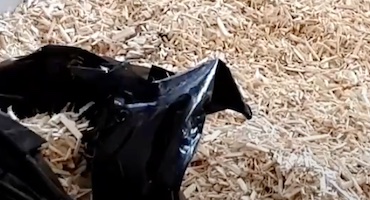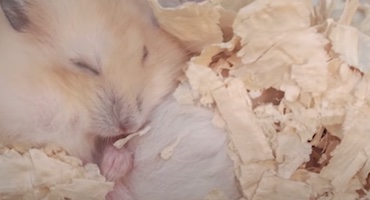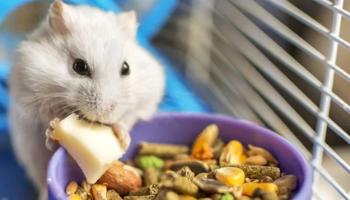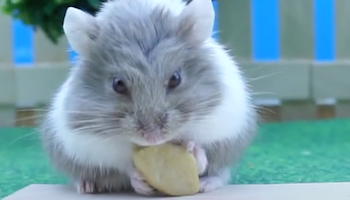Popcorn is a snack that many people enjoy. It is common in movie theatres, and it also can be used as a decoration! The sweet, buttery goodness of a nice batch of popcorn is unbeatable. Our furry friends can enjoy this too! Yes, hamsters CAN eat popcorn.
Popcorn is a type of corn kernel, which expands and puffs up when heated. The seed can pop up to three feet in the air when it is ready! It can be cooked in a microwave or on the stove top!
There are a few rules to follow when giving your hamster popcorn. All snacks are to be served in moderation. Here is all the information you need on giving your critters popcorn and how to prepare it properly.
Syrian hamsters are the heftiest of the domesticated hamster family. They can have around five pieces of popcorn per week, spread out. Syrians will most likely eat half, then hide the rest away in their secret storage spot.
Slightly smaller than the Syrian, Campbell’s Dwarf hamsters can have about three pieces of popcorn per week. Splitting the popcorn in half will help them eat the popcorn in comfort. They will enjoy this as a midnight snack since they are mainly nocturnal.
Robovorski hamsters are the littlest breed compared to the other dwarf types. Because of this, limit giving popcorn to them once a week. Be sure to crush the popcorn slightly, their tiny mouths will have an easier time munching on this treat.
The Chinese dwarf hamster is commonly mistaken for a mouse due to their somewhat long tail. Give the hamster popcorn about twice a week. Chinese dwarves love to burrow and make tunnels. No doubt you will find a pile of stowed away popcorn deep in the tubes they create in their habitat!
A well-balanced domestic hamster diet should include a variety of multiple things. Buying high quality, store-bought pellet food will be the primary source of their daily nutrition. Mixed food should contain many different types of elements. Timothy hay will be the foundation of the food, followed by various oats, vitamins, and minerals.
Wild hamsters will eat different types of grasses, oats, seeds, and anything else they can find in the wilderness. Their diet will also include insects, such as worms, grasshoppers, and any other small invertebrates they forage. On occasion, wild hamsters have been known to eat little frogs and lizards as well.
What are the health benefits of eating popcorn?
Plain, unsalted popcorn is a perfect snack for your hamster to nibble on. Popcorn is high in fiber; this will help support the bones and digestive system. Plus, popcorn is great for hamster pups and hamsters in the breeding process.
It includes vitamin A, folate, iron, niacin, riboflavin, and thiamin. Those are all essential vitamins and minerals that will help your hamster grow up. Breeding mothers will benefit from the nutrients, adding extra support.
Popcorn also contains high amounts of calcium and phosphorus. Calcium relates to serving support for the joints and bones. Phosphorus impacts the way muscles move and provides support for the muscles.
What are the risks of hamsters eating popcorn?
Snack food like popcorn can be harmful in large amounts. Hamsters can only have plain, unsalted, unbuttered popcorn. Salt and butter add extra calories, which can cause your hamster to gain un-needed weight. Salt will present a variety of problems, including diabetes.
Diabetes is a condition that causes high blood sugar levels in the body. Some species of hamster can become diabetic if they eat high amounts of sugar and salt. Dwarf hamsters are predisposed to have a higher chance of forming diabetes. Dwarf hamsters are prone to diabetes because of their smaller size.
You should never. It’s cooked in a kettle with sugar. After the popcorn cooks, it comes out with a thin layer of sugar coating. You should never give your hamster kettle corn. The kettle cooked popcorn is also very sticky, which could cause your hamsters’ cheek to become impacted.
Popcorn can also get stuck in a hamster’s cheek pouches. The dryness of the popped kernels could stick to the inside of the cheek. Leaving the dry kernel sit in your hamster’s cheek will cause impaction. If this happens, your hamster will need to have surgery.
Boiled corn can also aid in avoiding cheek impactions, but only give in small amounts. The corn has a high volume of acid and will most likely give your pet a stomach ache if fed in larger quantities.
Can hamsters eat the uncooked kernel?
The kernel is the uncooked seed of the corn plant. You should never give your hamster the kernel. The hardness of the shell of the nut is tough to break and may harm your hamsters’ teeth. That could cause pain and discomfort while eating other food items.
Choking is also a risk because of how minuscule the kernel is. Swallowing the core will cause an upset stomach and possible constipation. Constipation in hamsters is deadly because of their small stomach system.
What are other uses of popcorn for your hamster?
Hiding popcorn around their habitat would make an excellent foraging activity. Building puzzles will encourage your hamster to smell and search for the treat, much like they would do in the wild. You should try adding popcorn to puzzle toys to inspire your hamster to find the source of the delicious scent!
Conclusion
Plain popcorn is a healthy and fun treat for your hamsters. They contain beneficial nutrients to further contribute to your hamsters’ health and wellbeing. This snack makes a great treat to use in puzzles and to hide around your hamster’s enclosure.
Do not give your hamster an unpopped kernel. This can be a choking hazard and could become impacted inside their cheek pouches. You should not give your hamster popcorn every day. They serve as a treat to your hamster’s regular diet, which should include a store-bought mixed diet, along with other fruits and vegetables.
Share
Related Posts
There are a lot of things that you need to be careful of when you are feeding your [...]
Hamsters are little and cute pets that need a balanced and wholesome diet to stay healthy and happy. [...]
Dwarf hamsters are a small species of hamsters which grow just about 4 inches in size. These hamsters [...]





